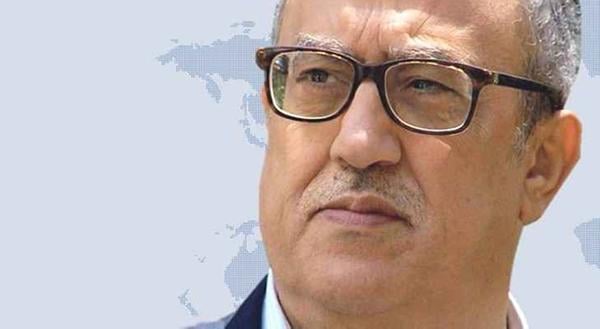
The late Jordanian writer, Nahed Hattar.
Understanding the religious passions dominating the Middle East’s political sphere seems to be a prerequisite for testing the spread of democratic institutions and the norms necessary to support them. King Abdullah II of Jordan (a direct descendant of Prophet Mohammad) repeatedly says that the war on terror is foremost a war inside Islam. Recently, he visited the family of the late writer Nahed Hattar to pay condolences, affirming that Jordanians “denounce the cowardly criminal act” that targeted him on September 25.
In his initial confession to Jordanian police, the killer, who was known for his extremist thoughts and behavior, said he targeted Hattar “after hearing that he posted an offensive caricature on his Facebook page and decided to kill him.”
One of the central features of civilized behavior is that one should not use violence to solve conflicts. It seems the Middle East, where debate, argument, and dialogue are rare as instruments of the intellectual dialect, did not read the speech of King Mohammed VI of Morocco (another direct descendant of Prophet Mohammad) addressed to the Moroccans on August 20, when he reminded the citizens of the problems plaguing the region, such as succumbing to extremist and terrorist groups: “Is it conceivable that God, the Most Merciful, the Most Compassionate, could order someone to blow himself up or kill innocent people?” King Mohammed VI stressed that those who call for murder and aggression, those who excommunicate people without a legitimate reason, those who interpret the Quran and the Sunnah to suit their purposes “are actually lying to Allah and His Messenger.”
He also asked his people this pivotal question, which was ironically not irrelevant to the theme of the cartoon which Hattar has shared on his Facebook: “How could anyone of sound mind believe that the reward for jihad is a number of virgins? How could one possibly accept that anyone who listens to music will be swallowed by the depths of the earth, and other such lies? As attested by the history of mankind, it is impossible to achieve progress in a society which is plagued by radicalism and hatred.”
Hattar, who was facing trial for sharing a cartoon on his Facebook page, was on his way to attend a court hearing when he was shot dead. The cartoon featured an illustration of God under the title “God of Daesh,” using an Arabic acronym for ISIS. Right after sharing the cartoon, the Jordanian Prime Minister, Hani al-Mulki, ordered his interior minister to summon the writer and to initiate legal proceedings against him. The cartoon has sparked outrage in social media and the Jordanian Ifta’ Department issued a statement criticizing “the insult to the divine entity, Islam, and religious symbols.” Meanwhile, several Twitter users called for legal action to be taken against Hattar: “He should be imprisoned,” “killed,” “executed.”
The appalling hate speech in social media platforms deserves a moment of contemplation of the reality of Middle Eastern societies, with the spread of extremist dialect sweeping through for decades. Before turning himself in, Hattar published an apology and an explanation on his Facebook page, saying that he shared the cartoon to mock the terrorists and how they view heaven and that it was not meant to insult God. As a matter of fact, social media accounts were celebrating Hattar’s death, saying he deserved it for blasphemy, and right after the assassination, people started tweeting: “He deserves being killed this Christian pig,” “God’s revenge took his life,” “We will not accept anything other than this.”
Hattar’s assassination sheds light on virtual media and how it is used as a weapon by the terrorists to promote their ideologies of extremism. It also marks a new challenge for the state: terrorists are not only on the borders with Syria and Iraq, but amongst Jordanians themselves, inciting the murderer of Hattar, as well as rejoicing the crime. In fact, Jordan’s police has declared it arrested several people accused of circulating videos and posts on social media “promoting hate” days after the assassination, including a relative of the shooter who created a Facebook page called: “Yes to Free the Killer of Hattar.”
Seeking toleration in the Middle East for a greater range of speech and lifestyles will be hardly obtained and this sense of hate speech makes it harder still to grasp the possibility of social cooperation. Moreover, convincing hate promoters to view their interactions with the other as positive-sum processes is rather a joke as there is much more to terrorist forms of violence than just terror: intellectual terror, propaganda, hate speech, political mobilization, and destruction of peaceful economic structures, are all but few examples. Meanwhile, the state is not clear about where it stands, what message it wants to convey, what efforts have been made to confront and remedy social division and extremism, and the role of media in rebutting the fanatic discourse to maintain moderation, if any, especially putting an end to extremism and hate speech toward the other.
Middle Eastern societies do not tolerate freedom of expression, experimentation, falsification, and theory formation to nation building. They do not accept doubt and dispute as centerpieces of a functional democracy. They think of democracy in the same way that they think of belief—as a moral judgment, as assertions; not as science—as a method of trial and error, and as a public marketplace of ideas. This brings us back to issue of responding to political violence and how to convince these societies that violence is immoral, fruitless, or both.
I do not see how we can reach a “common interest” with the extremists as our vision of toleration, pluralism, and political stability may not be the mirror image of their own vision. Settling the nature of the game will take hard political choices, whose costs will be significant. And this is exactly why the King of Jordan, for instance, says that the war on terror requires both military and ideological measures.